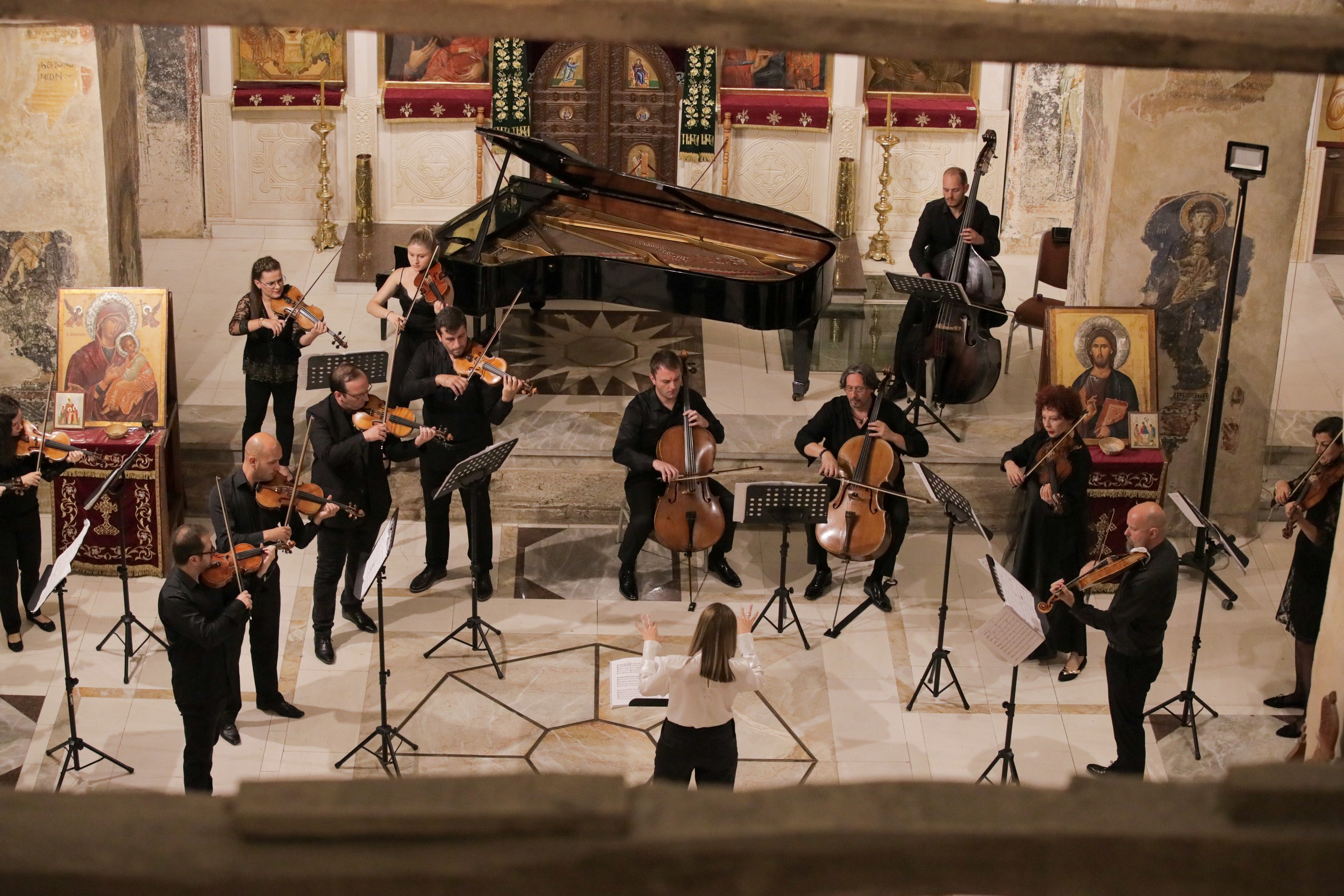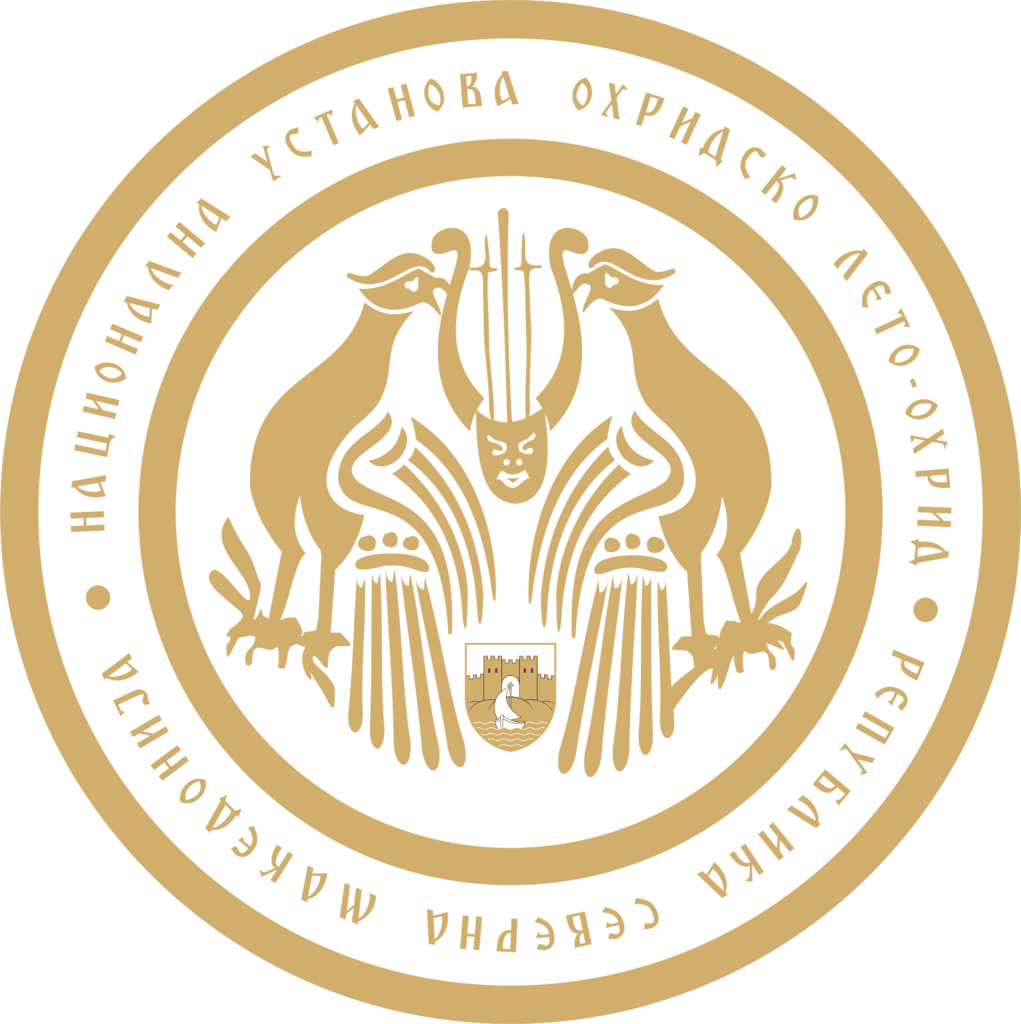
In the first part of its programme, the 62nd Ohrid Summer Festival offered two extraordinarily interesting shows to the audiences in the St Sophia church, with the Macedonian chamber ensembles “New Breath” and “Profundus”. We can connect the work of these two orchestras by many things, but it especially important to mention is their mutual tendency to unite the best young Macedonian instrumentalists in chamber formations that will promote contemporary music creations. At this point we will remember the chamber ensemble “St Sophia” which in 1968 was created by the famous Macedonian composer Toma Proshev and in the 70s of the last century played a key role in the promotion of pieces by Macedonian composers, but also introduced the European avant-garde style to our audience. We experience the formation of the “New Breath” and “Profundis” orchestras as a historical follow-up to “St Sophia” which was bound to happen.
“New breath” is a chamber ensemble under the baton of the French conductor Pascal Gallois, which has recently started working within the Phipharmonic Orchestra of North Macedonia and is consisted of members of that orchestra, whereas “Profundis” is a string chamber orchestra consisted of excellent instrumentalists from the Philharmonic orchestra and the National Opera and Ballet. The “Profundis” ensemble has been under the manager of the young maestra Gjurgjica Dashikj for three years now.
Both highly-professionally prepared ensembles performed at “Ohrid Summer Festival” with carefully chosen pieces from the 20th and 21st centuries. For the audience regularly attending Festival concerts this brought freshness in the programme concept and was an excellent contra-point to all the evenings filled with classical programme from other eras.
At the concert of “New breath” we heard pieces by Shoenberg, Velkovska – Trajanovska and Webern.
Shoenberg’s string sextet “Verklärte Nacht” from 1899, or the most significant piece by the author in his early period (when he still nourishes the respect towards his German predecessors Brahms and Wagner, but also innovatively announces his authentic composer’s tendencies, atonality and serialism) in an outstandingly harmonized performance of the string part of the ensemble, it was a really rare occasion for the audience, additionally enriched with the unique acoustics of the church St Sophia. The six excellent instrumentalists, Ilkoski, Trajkovska, Baftiari, Laovski, Krapovski and Gonevski, in a warm and emotionally balanced interpretation brought all the hidden messages engraved in the Shoenberg’s genius music. It was a “sound floating”, a symphonic poema for two violins, two violas and two cellos which should unveil the transcendence of love between a woman and a man from its darkest side to the enlightening in a single night.
The next piece, an especially suggestive composition with an intriguing title “Omen” by the contemporary Macedonian composer Valentina Velkovska Trajanovska, was an exciting and appropriate continuation of the concert. The programme direction of this piece made twenty years ago in the early work of the author, leads us towards a “light motif” found in the painting “The Slave Ship” by the Romanticism English painter William Turner. “Omen” is a representation of a pre-mortal frightening moment when helpless people, slaves, are thrown in the sea to be drowned. The fascination of the author Velkovska- Trajanovska by the visual strength in obvious, and she puts it in a powerful manner in an authentic “sound concept”. “Omen” was brought by the artists from the orchestra “New Breath” as a gradation from the vibratos, tremolo, glissandos through the tremble of the clarinet, violin, cello, percussions and soprano. The constant intensifying of the dynamics filled the space with a strong sound vibration and left a strong impression at the audience. We would inevitably notice that the message Velkovska- Trajanovsk’ “Omen” brings is accepted as a reflection of the events the Macedonian nation faces at the current moment, which the author confirmed herself.
Apart from Bojan Ilkoski on violin and Paskal Krapovski on cello, the expressive image of “Omen” was completed by the excellent Igor Bakrevski on clarinet, the soprano Gonca Bogomorova Krapovski and Atanas Aleksov on percussion.
The concert trip of “New breath” was finished with the piano quintet by the Austrian composer Anton Webern and the very sprout of the Shoenberg’s Vienna school. This piece, made in 1907, in the early work of the author, from one side is an homage to the great Brahms and crown in the chamber opus, the piano-quintet in F minor. From another side, by setting a richly expanded, chromatic C major and the constant tendency for getting further from tonality, in the style of the young Webern, he draws the direction of his mentor and the way to open the music tendencies in the later avant-garde composer directions in the 20th century. This composition with a complex structure enabled the artists from the orchestra to show their soloist potential in the individual melody lines, but also a synchronized unity in the “tutti” sequences. Besides the mentioned artists in the string section, in the Weber’s quintet there is the pianist Marijana Nikolovska. It is very important to point out the role of the conductor Pascal Gallois, the basic actor in the ensemble, who with a visible dedication and piety unites the musicians in a single unified sound whole and simply elicits their whole creative and artistic potential.
In a fully equivalent vibration we add the comment for the concert evening of the chamber orchestra “Profundis”. On the programme – two dramatically provoking pieces: Chamber Symphony op110/a in C minor, by Dmitry Shostakovich and the primal performance of the double concert “Tabula Rasa” by the contemporary Estonian composer Arvo Pärt.
The chamber symphony, a master adaptation (arranged for string orchestra by the Russian conductor, violist and expert and arranger of Shostakovich’s work, Rudolph Barshai) of the string quartet No.8, is one of the most powerful works in music ever written in the 20th century. It sublimates the whole controversy the artistic image of Dmitry Shostakovich brings: the obsessive personality (the presence of D S C H motif), the emotional answer of the consequences of the fascism and war, the victims of the holocaust, but also his personal sufferings from the Stalin’s totalitarianism and terror. It was a real adventure to hear his mourning Largo, the demon dance for the death in Allegro molto, the sarcastic waltz in Allegretto, the terrifying accords in his fourth movement and the mourning fugato in the finale, performed by the orchestra “Profundis”. Our analysis for the performance post factum, will show that the credits for the successful reincarnation of the musical spirit of Shostakovich equally belong to the excellent musicians of “Profundis” – concer masters and group leaders of the most significant orchestras in Macedonia, but also to the energetic and vibrant Gjurgjica Dasikj. The impression was that the whole ensemble has deeply dived in the all articulation, dynamic and form-making details of the score, so the audience had the opportunity to hear the piece in full colour. Opposite to Shostakovich’s grotesque, “Profundis” revealed the minimalist world of Arvo Pärt, the most performed alive composer of today. Outstandingly authentic, Pärt takes inspiration in the mysticism of the Middle Ages Gregorian melodies and Orthodox music stylistics making an autonomous sound which redefine the already-set concepts of music and music composition, but not only that, but that is art enhancing philosophical redirection of the priorities of life of the modern human. The piece “Tabula Rasa” (1977) for two violins, prepared piano and string orchestra that we heard in an impressive performance by Anna Kondratenko and Vladimir Kostov as soloists on violin (both concert-masters in the Macedonian Philharmonic Orchestra, (with support by Kliment Todoroski, himself a concert master in National Opera and Ballet and in “Profundis”), Petar Makarievski on prepared piano and the orchestra “Profundis”, as a music score is actually a turnover and pathway in a historic sense which Arvo Pärt sets, and the contemporary composers follow and upgrade in new music horizons.
As an addition to this inspiring concert, we heard an encore, the Puccini’s emotional elegy “Chrisantems” in honour of the conductor Sasha Nikolovski – Gjumar.
The programme collage of both concerts was a real dessert for the lovers of various music directions from the 20th and 21st centuries. The presence of both orchestras, “New Breath” and “Profundis”, we greet wholeheartedly as a gust of new energy, so much needed on the culture scene in our country.
Vikica Kostoska Peneva

